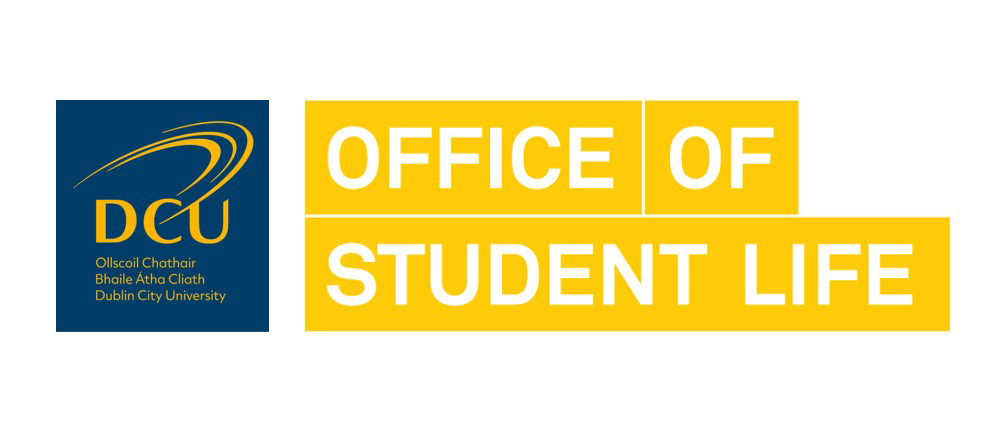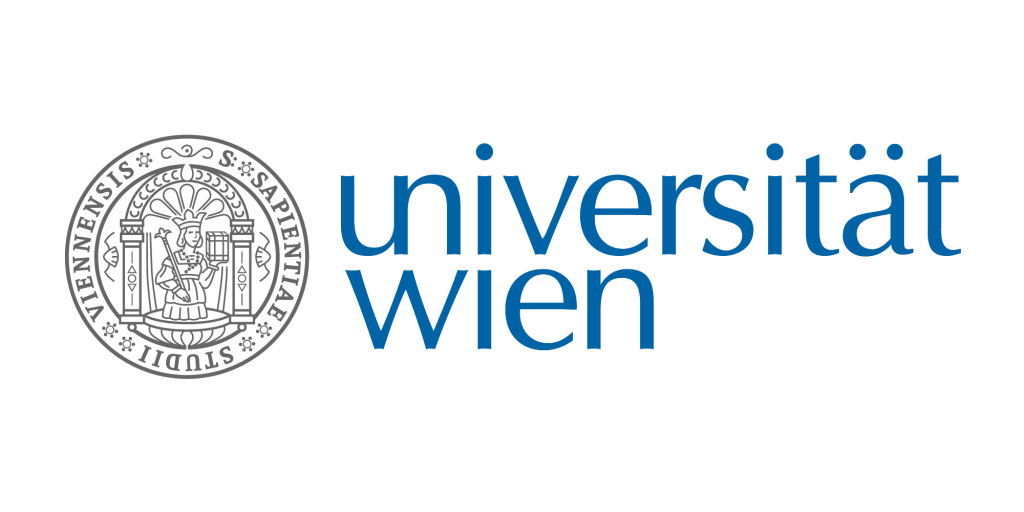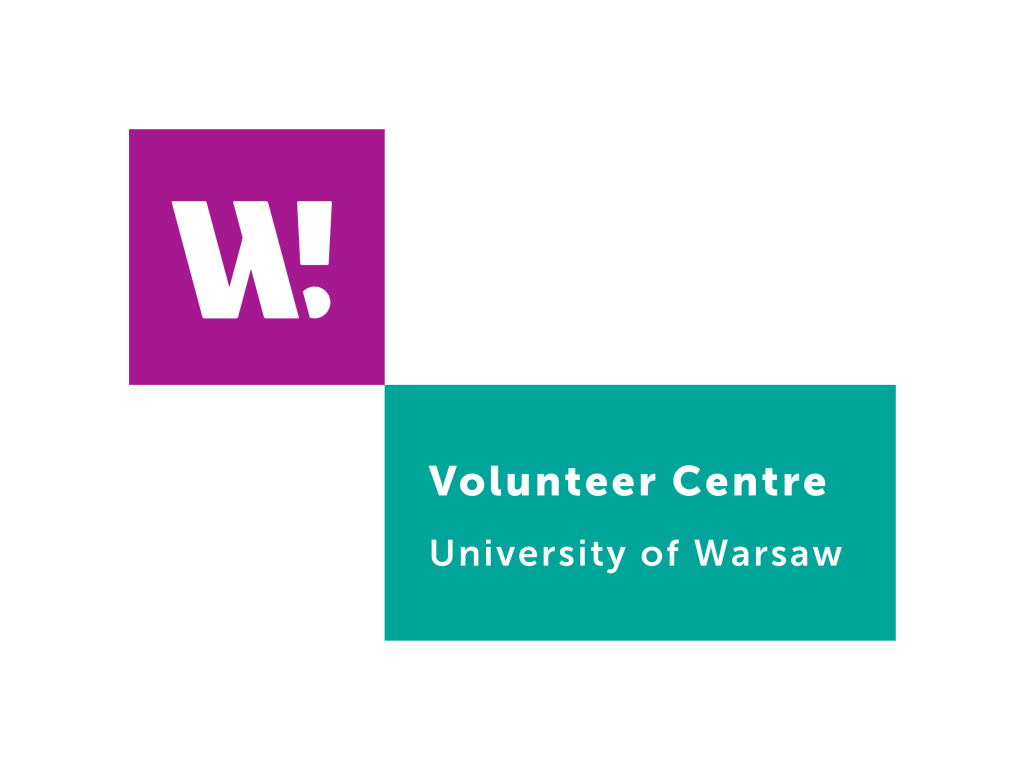European STEP – Student engagement
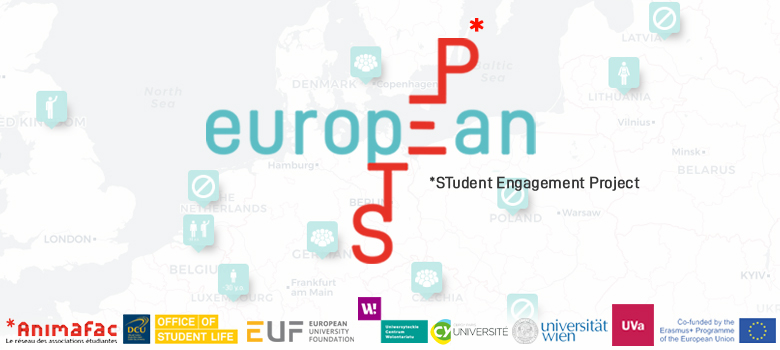
European STEP – English version
What role for youth engagement in Europe? Is student engagement recognised and valued within academic currila? If so, in what way? In order to better understand the daily lives of young people engaged in extracurricular activities and to better support them in identifying and promoting their skills, Animafac and six partners run between 2018 and 2021 the European STudent Engagement Project, a major study on the recognition of student engagement in Europe.


The new EU Youth Strategy of the European Commission for 2019-2027 emphasises the active role of the youth in society and the importance of their engagement and “civic, economic, social, cultural and political participation”. However, youth engagement is often overlooked and undervalued.
In this context, Animafac has coordinated the Erasmus + “European STudent Engagement Project” (European STEP) between 2018 and 2021, in cooperation with six European partners: the European University Foundation (EUF) in Luxembourg, the Office of Student Life of Dublin City University in Ireland, CY Cergy Paris Université in France, the University of Valladolid in Spain, the University of Vienna in Austria and the Volunteer Centre of the University of Warsaw in Poland.
This project focuses on the recognition of young people’s active participation in student academic curricula. It will provide an overview of practices in the countries of the European Union (EU). In the long term, the project aims to contribute to the recognition and enhancement of student engagement in Europe, in particular as a factor in the development of key and cross-curricular skills complementary to the academic path.
European STEP aims to reach the 28 countries of the EU, 300 HEIs and 150 000 engaged students from the universities of the consortium and their partners, and from the student association networks connected to the project such as the European Youth Parliament (EYP), the Erasmus Student Network (ESN) and the Young European Federalists (JEF) at a European level, and all the association of Animafac’s network in France
The intellectual outputs of the project:
- Mapping of policy frameworks for student engagement recognition in Europe (2018)
- Preliminary report on the recognition measures implemented in European Higher Education Institutions: European STEP online survey (February 2019 – April 2019) and Survey Report (2019)
- Qualitative Study of the mechanisms for student engagement recognition in HEIs in Europe : interviews with students, teachers and staffs and Study Report (2020)
- Guidebook of practices for engagement recognition (2021)
- Engagement and competencies platform to support students in the identification of the skills they acquired during their engagement experiences (2021)
- Training kit : organize activities to create ambassadors of student engagement recognition (2020)
- Booklet of recommendations in favour of student engagement and its recognition in Europe (2021)
Multiplier events for the dissemination of the project’s results:
- August 30th, 2019 – Batz-sur-Mer, France (Animafac) (see below)
- September 24th, 2020 – Vienna, Austria (University of Vienna)
- November 24th, 2020 – Valladolid, Spain (Observal,, University of Valladolid)
- April 23rd, 2021 – Warsaw, Poland (Volunteer Centre, University of Warsaw)
- May 13th, 2021 – Dublin, Ireland (Office of Student Life, University of Dublin-City)
- Final conference June 2021 – Paris, France (Animafac) (see below)
- 30 août 2019 – Batz-sur-Mer, France – Organisé par Animafac
- 24 septembre 2020 – Vienne, Autriche – Organisé par l’Université de Vienne
- 24 novembre 2020 – Valladolid, Espagne – Organisé par l’Observatoire de l’Université de Valladolid
- 23 avril 2021 – Varsovie, Pologne – Organisé par le Centre des volontaires de l’Université de Varsovie
- 13 mai 2021 – Dublin, Irlande – Organisé par le Bureau de la vie étudiante de l’Université de Dublin City
- 23 juin 2021 – Evènement de clôture – Juin 2021 – Paris, France

This mapping presents an overview of the different legislative frameworks that rule student engagement recognition in the European Union Member-States, six years after the EU Council recommendation of December 2012 inviting the countries to set up validation measures for informal and non-formal learnings, including solidarity and volunteering activities. It was developed through a study of regulations and laws in force in each country.
On the one hand, this study highlighted that there is no unique terminology for “engagement” at the European level. Some countries will rather speak about “volunteering”, “commitment” or “active participation”. Thus, student engagement is understood here in a broad sense to refer to students’ involvement in citizenship-related and volunteering activities, their political and associative commitment as well as their involvement within their universities and campuses.
On the other hand, the research underlined the heterogeneity of situations between countries in terms of legislation on student engagement recognition. The 28 Member States have been classified into three categories.
<iframe width= »100% » height= »300px » frameborder= »0″ allowfullscreen src= »//umap.openstreetmap.fr/fr/map/european-step-en_314049?scaleControl=false&miniMap=false&scrollWheelZoom=false&zoomControl=true&allowEdit=false&moreControl=true&searchControl=null&tilelayersControl=null&embedControl=null&datalayersControl=true&onLoadPanel=none&captionBar=false#4/53.51/8.88″></iframe><p><a href= »//umap.openstreetmap.fr/fr/map/european-step-en_314049″>Voir en plein écran</a></p>
Fly over the map and click on the different markers to discover which framework on the recognition of youth engagement applies in the different countries of the EU. To access the other categories presented on the map, click on the icon « Voir les calques »and select the desired categories by clicking on the icon « Montrer/masquer un calque ».
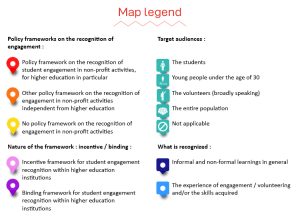
How to read the map?
Category 1 regroups the countries where there is a legislative framework on student engagement recognition for higher education in particular, i.e. higher education is covered among other things by the legislation so that students’ active participation and the related skills are validated as part of the curricula (ECTS credits, timetables arrangements, annex to the diploma etc.).
For instance, in France, the Equality & Citizenship Act promulgated in January 2017 requires higher education institutions (HEIs) to adapt the curricula of students exercising associative responsibilities and to recognise the skills acquired in the context of extra-curricular activities on the same basis as disciplinary skills.
Category 2 concerns countries where there is a legislative framework on the recognition of engagement independent from higher education, i.e. the engagement experience and/or the related skills can be recognised by host organisations or certified institutions. Depending on the case, the framework makes it possible to obtain certificates of engagement, volunteering certificates or even to attest the skills acquired. These can be used to enter the labour market or apply to university. However, they are not taken into account in academic curricula.
For instance, in Austria, according to the Volunteering Act every volunteer can ask the host organisation for a certificate of activity and skills : the volunteer Passport (“Feiwilligenpass”). This law does not involve HEIs.
Nevertheless, in the countries of category 2, HEIs can take the initiative to implement recognition and validation measures, such as Bonn University in Germany and Nova University in Lisbon in Portugal.
Category 3 gathers countries where there is no national legislative framework on the recognition of participation. Nonetheless, there can be local initiatives and national reflections on the matter. For instance, in Sweden, there is no legislative framework but a Commission was created in 2015 to consider the implementation of validation of the skills acquired outside the education system.
Furthermore, three subcategories were created:
- Subcategory A specifies the public targeted by the legislation: students, young people under 30, volunteers in the broad sense, or the entire adult population
- Subcategory B identifies what is covered by the legislation: experiences of engagement, volunteering and/or the acquired skills; or informal and non-formal learnings in general
- Subcategory C qualifies the nature of the legislation for countries where there is a framework for the recognition of student engagement in higher education (category 1): incentive framework or binding framework.
Is student engagement recognised and valued within academic curricula? What are the recognition and support mechanisms of student engagement in higher education institutions (HEIs) in Europe? How do the institutions organise the recognition of student engagement?
Coordinated by the partners from the Volunteer Centre of the University of Warsaw, with the support of the consortium, the second intellectual production of the project consisted of a survey on the recognition of student engagement disseminated from February 19th to April 29th 2019 to European HEIs; and a survey report, available here. The survey interrogated institutions in Europe on their support mechanisms focusing especially on the recognition of student engagement. The purpose was to collect objective data on the institutions’ strategies and policies in this matter: can students’ activities in frames of the broadly understood topic of student engagement lead to formal validation in their academic life?
Access annex 1 : European STEP Survey
Access annex 2 : European STEP Survey Results
Expert Voice « An institutional perspective on the recognition of student engagement », Katarzyna Kucharska from the University of Warsaw
The European STEP survey report emphasises the situation of student engagement recognition according to 120 complete answers in a 104 higher education institutions from 26 EU countries (we did not have answer from Luxembourg and Slovakia).
Number of responses by countries (N=120):
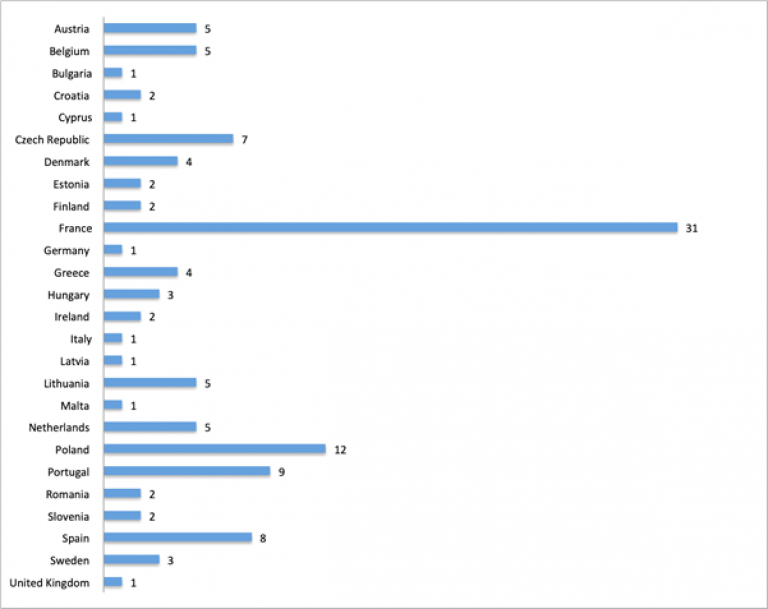
NB: The results announced may be influenced by the weight of France insofar as we obtained a significantly higher number of responses in France than in the other countries.
The survey results revealed that student engagement is a concern of the responding institutions. For a large majority, engagement is part of the institution’s strategy (only 6 indicate the opposite and 5 do not know) and there is a policy for student engagement (for 65% it is already in place and for 9.17% it is ongoing).
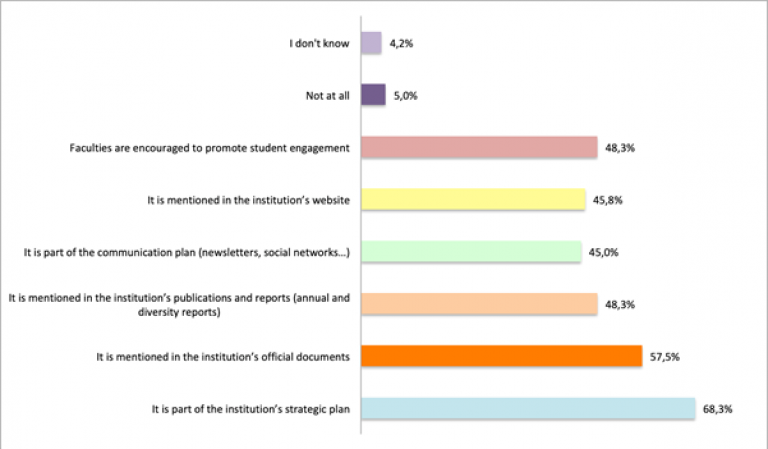
In addition, the importance of engagement has increased within institutions over the past six years: 48.3% indicate that it has increased and 23.3% that it has increased significantly.
How has the importance of student engagement changed over the past six years for your institution? % (N=120)
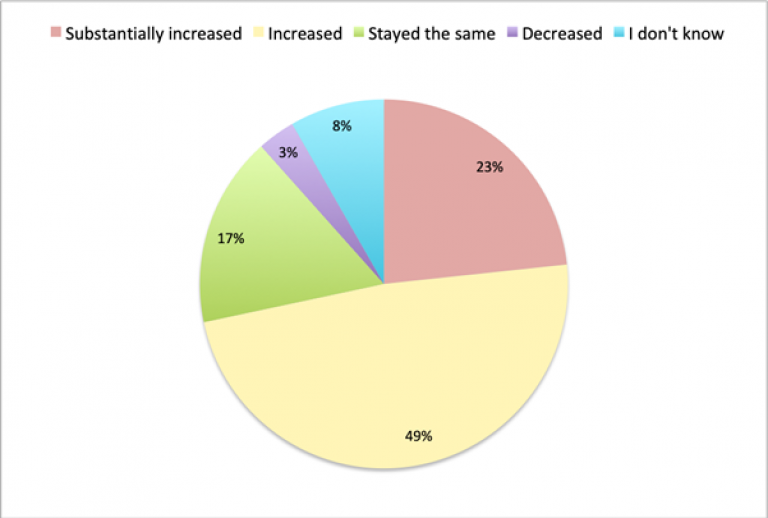
Different types of activities can be considered as student engagement by the institutions:
- activities conducted within the institutions (80%): including activities in student associations (74,2%); artistic and cultural activities & short-term projects or events (65%); mandates as student representatives i.e. student with responsibilities within the institution (63,3%)
- activities external to the institutions (64,2%): including activities in NGOs, associations, youth organisations, citizenship-related activities (54,2%) and artistic and cultural activities in external entities (51,7%); mentoring activities (47,5%)
- activities in cooperation between the institution and external entities (51,7%): the respondents indicated that institutions sometimes sign agreements with NGOs, companies, associations, public institutions, municipalities and other educational institutions, in which their students can get engaged. For instance the Université Côte d’Azur in France signs partnership agreements with organisations that share their values, such as solidarity organisations like Amnesty International and the Red Cross.
111 respondents indicated that there is at least one modality of recognition for student engagement in their institution: it represents 92,5% of the answers. The three most common recognition measures in those HEIs are:
- ECTS credits (53,3% of the cases i.e. 64 answers);
- Valorisation of student engagement: dedicated space for associations, possibility to set up events within the campus institution, institutional communication on students’ activities (49% i.e. 59 answers);
- Integration of student engagement as part of the curricula in some of the institution’s study programmes (44,2% i.e. 53 answers).
How does your institution recognise student engagement? (%, N=120)
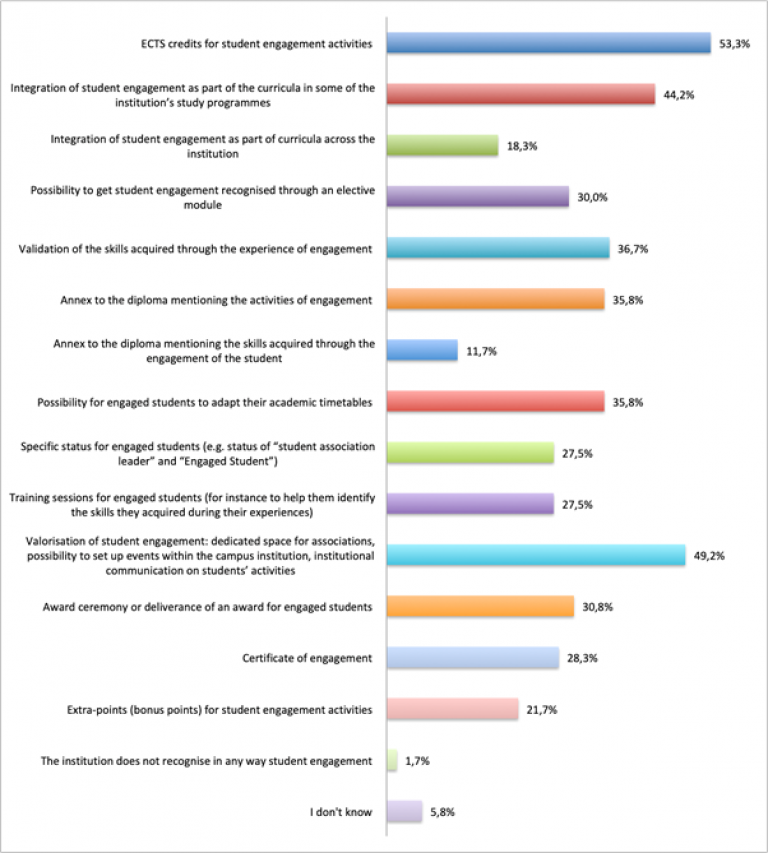
The question of the recognition of extra-curricular competences has yet to be addressed in the third phase of the project. Indeed, the investigation has shown that in 26,7% of the cases, the institutions recognise (will recognise) engagement skills that can be different and complementary to the academic skills. The general tendency among the institutions of the survey is to recognise soft skills *, intercultural competences and employability skills. However, it is a minority of institutions from the survey: 34,2% of the institutions do not recognise competences that are not explicitly mentioned in learning outcomes or other official documents, and 37,5% of the respondents did not know the answer.
Finally, 70% of the respondents would like to be informed about the outcomes of the European STEP project, which is encouraging: HEIs are interested in the topic.
* Defintion of “soft skills” from the Erasmus + Elene4work project: “Soft Skills represent a dynamic combination of cognitive and meta-cognitive skills, interpersonal, intellectual and practical skills. Soft skills help people to adapt and behave positively so that they can deal effectively with the challenges of their professional and everyday life”, www.elene4work.eu/el4w-project/
The 7 European STEP project partners conducted 90 interviews to understand and analyse how the place of informal and non-formal education and the skills it conveys in the higher education system varies. The interviews were conducted between July and December 2019 in 33 higher education institutions in 11 different countries: Austria, Belgium, the Czech Republic, France, Hungary, Ireland, Lithuania, the Netherlands, Poland, Portugal and Spain.
46 engaged students, 42 teachers and/or staff members involved in student engagement issues and 3 representatives of host organisations of engaged students participated in the interviews.
Based on the preliminary report and the qualitative study, the partners of the projects elaborated a guidebook of practices regarding the recognition of student engagement and how to advocate in favor.
This guide is composed of two main parts:
- The first one highlights the different practices of European HEIs in the matter of the recognition of student engagement while asking the different questions: What is student involvement for the HEI? How do the students see the recognition in their HEI? How do the professors see the recognition in their HEI? How does the HEI implement the recognition?
- The second one is a four-step guide to help students and staff members of HEIs to advocate for the recognition of student engagement. Thus, it is composed of a self-diagnosis that will allow students and academics to know how their HEI is doing in terms of student engagement recognition. This part will also propose levers for change, arguments, and resources to implement the changes.
You can download the whole Guidebook of practices here.
The Engagement & competencies platform allows students to identify and evaluate the competencies acquired during engagement.
It is equally suitable for students who have just started engaging or for those who are further along in their engagement journey.
This platform can also be used by professionals to help students identify and evaluted their competencies.
The competencies and soft skills used on this platform are the result of the combination of the European projects « Elene4work » and European STEP.
This training kit aims at helping professionals of higher education institutions as well as engaged students to develop training actvities in order to :
- Build a network of qualified trainers on the matter of student engagement, student engagement skills and recognition;
- Reflect on the recognition of student engagement in a European perspective, in a multicultural and multi-stakeholder context;
- Train for the implementation of recognition measures in higher education.
- Train for the identification and development of engagement skills;
- Evaluate and appropriate the tools Europass, Youthpass and ECVET.
Who for ?
These training activities can be organised for engaged students as well as for professionals of higher education institutions.
Content of the training kit :
This training kits contains :
- A practical guidebook « Guidelines on how to conduct training activities to create ambassadors of student engagement recognition »
- Pedagogical material for 9 training sessions :
- Tutorial videos (from the online European STEP training organised online in 2021)
- Training content, exercises, resources
Session 1 – Introduction :
Session1_Introduction to the training_presentation
Session 2 – Engagement & Competencies
Session 2_Competences gained during Student Engagement_presentation
Session 2_My engagement path – supporting material
Session 3 – Tips for building a LinkedIn Profile
Session 3_Tips to build a LinkedIn profile_presentation
Session 4 – Adequacy between Student Engagement and Curricula
Session 4_Introduction to the session
Session 4_Task 1_Characteristics of engaged students
Session 4_Task 2_Connecting the motivations with different paths
Session 5 – Implementing a Multistakeholder Approach
Session 5_Implementing a multi-stakeholder approach_presentation
Session 6 – Advocating for Student Engagement Recognition
Session 6_Advocating for Student’ Engagement Recognition_presentation
Session 6_Group Exercise_Instructions
Session 7 – Let’s think strategically! – Implementation of a communication campaign to
attract students
Session 7_Let’s think strategically!_presentation
Session 7_Communication training
Session 7_Group exercise_Case 1
Session 7_Group exercise_Case 2
Session 8 – Engagement of students in the autism spectrum
Session8_Engagement of students in the autism spectrum
Session 9 – European tools
The first multiplier event of the European STEP project took place on Friday August 30th, 2019 in Batz-sur-Mer in France. It was organised by the European STEP project coordinator, Animafac. The objective of this day was to disseminate the results of the first steps of the study on the recognition of student engagement in Europe: the mapping of legislative and regulatory frameworks on the recognition of engagement in the European Union Member States; the results of the online survey disseminated to European higher education institutions; the launch of the last phase of the study with interviews with engaged students, professors and administrative staffs related to the subject.
During this day, national and international participants – committed students, academics, institutional actors and representatives of the associative world – gathered to discover the first results of the project, contribute to the reflection around its orientations, and thus be able to communicate on the project.
The morning was dedicated to two sessions of four workshops built using the techniques of active pedagogy and popular education.
- Workshop « Role-play – Advocacy for the recognition of student engagement »: it allowed engaged students to develop their arguments for a better recognition. Indeed, it was a question of preparing and simulating meetings in French institutions involving students, teachers and members from the office of student life and/or the rectorate, to debate on the recognition topic. The participants were able to take ownership of the first results of the study, identify examples of recognition processes and use them to build their advocacy. Several support documents were available for the participants: the mapping of legislative frameworks (O1), extracts from the report on the questionnaire distributed to higher education institutions (O2), an index of recognition measures set up in French institutions, documents on the French Equality and Citizenship Act, the EU Council recommendation of 2012 to recognise informal and non-formal learning, and several articles on the study.
- Workshop « Walking Gallery – Discovering the results of the study »: the participants were divided in three groups according to the countries’ classification of the mapping (one group for the countries with a policy framework on student engagement for higher education; one group for the countries with a policy framework on engagement independent from higher education; one group for the countries without any policy framework on the matter) with the objective to select the information related to their group. To this end, they had access to a panel of documents from the study. Each group presented their findings to the rest which lead to a collective discussion to question the notions of engagement and recognition. It was an opportunity for participants to learn from the study through the snowball effect, and better understand the project approach.
- Workshop “Recognition in a personal context”: participants were able to share their personal experience and discuss how their close ones perceive their engagement. The objective was to identify and deconstruct prejudices around engagement, and to allow engaged students to promote and advocate for their engagement experiences.
- Workshop “Escape game – European citizenship at risk!”: developed by the European Youth Parliament France (EYP), this serious game features a team of committed citizens to thwart all the riddles and try to preserve European citizenship. While addressing European issues, the participants had the chance to experience and test their approach to European citizenship and engagement.
During the afternoon, two round tables took place to discuss and contribute to the reflections on the European STEP project and to present what is happening at the European level both in terms of engagement mechanisms and projects conducted on the matter.
- The first round table « Civic service, European Solidarity Corps… How are national and European youth engagement mechanisms articulated? » proposed to explore the different youth engagement mechanisms that exist at national and European levels, their logics and what they reveal: do they reveal different ways of perceiving youth engagement in Europe? On this occasion, we had the pleasure to welcome Béatrice Angrand, President of the French Civic Service Agency, also in charge of the European Solidarity Corps and the French Erasmus + Youth Agency; Benjamin Beton, President of Erasmus Student Network France – ESN France; Sergine Bouche representing The Explorers of Engagement (members of the National Network of Junior Associations); and Darius Thomas, a Franco-German student, former volunteer in civic service.
- The second round table, « Towards a European reference framework of engagement skills? » presented different European projects on youth engagement and its recognition: ExtraSUP, European STEP and Social Erasmus +. The purpose was also to discuss the interest of a common reference framework of engagement skills at a European level: should one or more common/transversal tools be created? It brought together Caroline Bélan-Ménagier, Soft Skills expert and Open Badges, European Extrasup project; Lola Bonnet-Pol, Animafac, research officer in the European STEP project; Viktoriya Terzieva, European University Foundation, partner in the European STEP and SocialErasmus + projects.
Presentation of the short-term joint staff training:
The European STEP training, organised by the European University Foundation (EUF), with the support of Animafac and the European STEP partners, is meant to enhance student engagement recognition and promote the implementation of measures of recognition in Europe. It is organised for students, youth workers, administrative staff members and academics and aims at uniting diverse participants so that they work together to achieve the goals.
Objectives of the training :
- Build a network of qualified trainers on the matter of student engagement, student engagement skills and recognition;
- Reflect on the recognition of student engagement in a European perspective, in a multicultural and multi-stakeholder context;
- Train for the implementation of recognition measures in higher education.
- Train for the identification and development of engagement skills;
- Evaluate and appropriate the tools Europass, Youthpass and ECVET.
Trained staff will be able to help universities and implement new measures of recognition. Trained youth workers will train their peers about the gains of engagement recognition. A qualified network of trainers on this matter will emerge and be able to keep on training other people.
To help you, here is a document that aims at offering practical guidelines in the context of the above-mentioned objectives and develop training activities for engaged Higher Education Institutions (HEIs) staff, who will be the European STEP local ambassadors and will ensure the sustainable continuation of the project’s mission.
Program of the training :
Session 1 – Introduction :
Session1_Introduction to the training_presentation
Session 2 – Engagement & Competencies
Session 2_Competences gained during Student Engagement_presentation
Session 2_My engagement path – supporting material
Session 3 – Tips for building a LinkedIn Profile
Session 3_Tips to build a LinkedIn profile_presentation
Session 4 – Adequacy between Student Engagement and Curricula
Session 4_Introduction to the session
Session 4_Task 1_Characteristics of engaged students
Session 4_Task 2_Connecting the motivations with different paths
Session 5 – Implementing a Multistakeholder Approach
Session 5_Implementing a multi-stakeholder approach_presentation
Session 6 – Advocating for Student Engagement Recognition
Session 6_Advocating for Student’ Engagement Recognition_presentation
Session 6_Group Exercise_Instructions
Session 7 – Let’s think strategically! – Implementation of a communication campaign to
attract students
Session 7_Let’s think strategically!_presentation
Session 7_Communication training
Session 7_Group exercise_Case 1
Session 7_Group exercise_Case 2
Session 8 – Engagement of students in the autism spectrum
Session8_Engagement of students in the autism spectrum
Session 9 – European tools
Session 9_Europass presentation
Session 9_Youthpass presentation
Organisers:
European University Foundation – EUF (Luxembourg)
The European University Foundation (EUF) is a network of 25 universities in 18 countries across the European continent. The network is a promoter of diversity and social equity and aims to accelerate the modernisation of the European higher education area.
Animafac (France)
Animafac is the national network of student associations, supporting student initiatives, promoting engagement and allowing many young people to meet for more than 20 years. Animafac also supports socially innovative projects and is a resource centre that provides development tools to several thousand student associations each year.
Contact :
If you have any questions, you can contact Viktoriya Terzieva (EUF) or Lucille Manent (Animafac)
The final conference of the European STEP project took place on Wednesday, 23rd of 2021 in Paris in France. It was organised by the European STEP project coordinator, Animafac and by CY Cergy Paris Université. The objective of this day was to disseminate the results of the project.
During this day, national participants – committed students, academics, institutional actors and representatives of the associative world – gathered to discover the final results of the project.
Discover the round table of the project here (in French) :


